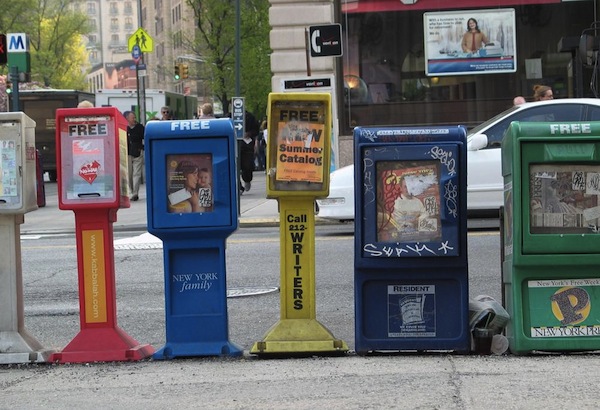Every week we round up industry news you may have missed while you were busy winning.
- The magazine industry is taking a stab at bundle pricing with Next Issue, an iPad app that gives subscribers “all you can read” access to titles such as Time, GQ, Vogue, Wired, Sports Illustrated and the New Yorker. A subscription to the monthly and bi-monthly titles is $9.99/month, or $14.99/month for additional access to all of the weekly magazines.
But with consumers increasingly finding their reading material through Facebook shares and Twitter links, do they still want to browse through a virtual newsstand which contains only a few titles that they’ll read regularly, with plenty more that they’ll never look at? Mathew Ingram says publishers will have a tough time recreating what is essentially a print model with advertising at its core:
If Next Issue were to pull individual articles out of its magazines and collect them based on popularity or some other algorithm — or made it easy for readers to share individual articles and other content outside the walled garden of the app itself — that might make it more appealing to those who have gotten used to a Flipboard-style model for consuming content. But it’s not clear that magazine publishers would be interested in doing that. For them, the game is about increasing circulation figures so they can try to keep their advertising revenues from bottoming out as print-based revenue continues to decline.
- “The promiscuity of our audiences is only going to dramatically increase,” says Wall Street Journal Digital managing editor Raju Narisetti. “You need great content and to be managing technology to create an amazing experience for users who can go anywhere they want. The experience is what will make them stay and come back.”
- Earlier in the week David Carr gave a sobering assessment of why the newspaper industry is having such a hard time adapting to the digital era. It’s those pesky legacy costs:
Those of us who work inside the racket like to think of our business as unique, but with underfunded pension plans, unserviceable debt and legacy manufacturing processes and union agreements, the newspaper industry looks a lot like, well, steel, autos and textiles.
- Frederic Filloux warns that traditional newspapers are about to lose the war against online-only publications and aggregators:
The essence of what we’re seeing here is a transfer of value. Original stories are getting very little traffic due to the poor marketing tactics of old-fashion publishers. But once they are swallowed by the HuffPo’s clever traffic-generation machine, the same journalistic item will make tens or hundred times better traffic-wise.
- But before we get too down, Ken Doctor says it’s important not to lose sight of the good news in the industry: Some paywalls are working; the rapid adoption of tablets is leading to more news consumption; publishers are having success with digital sponsorships; and publishers have a better understanding of their readers thanks to web analytics. So, yay?
- “There’s a fine line between finding efficiencies and cutting corners,” says Patch former editor-in-chief Brian Farnham of the Journatic episode.
- “In general our message is that people should be thoughtful.” The New York Times‘ social media guidelines are based on common sense.
- As more aunts and grandparents join Facebook, teens are turning to Twitter. At the same time, brands and publishers are creating deals and gadgets to target the 50+ crowd.
- Journalists from Digital First newspapers are creating “pop-up newsrooms” in their communities to encourage engagement with the public.
“We’ve decided in this digital age, with more people having tools to publish and make their views known, that we need to listen to and join that conversation that’s going on,” explains Steve Buttry. “It’s not all digital, but digital has certainly accelerated the community conversation and the ability for people to be heard.”
- BIA/Kelsey analyst Mike Boland breaks down the 5 biggest trends driving mobile, local media.
- Daily deals have a dark side for some businesses, and NPR is ON IT.
- Ellington CMS has been purchased by the Chicago-based ePublishing, Inc.
- And finally, Chicago Reader editor Mara Shalhoup asks, is work-life balance a real thing? Spoiler: No.








